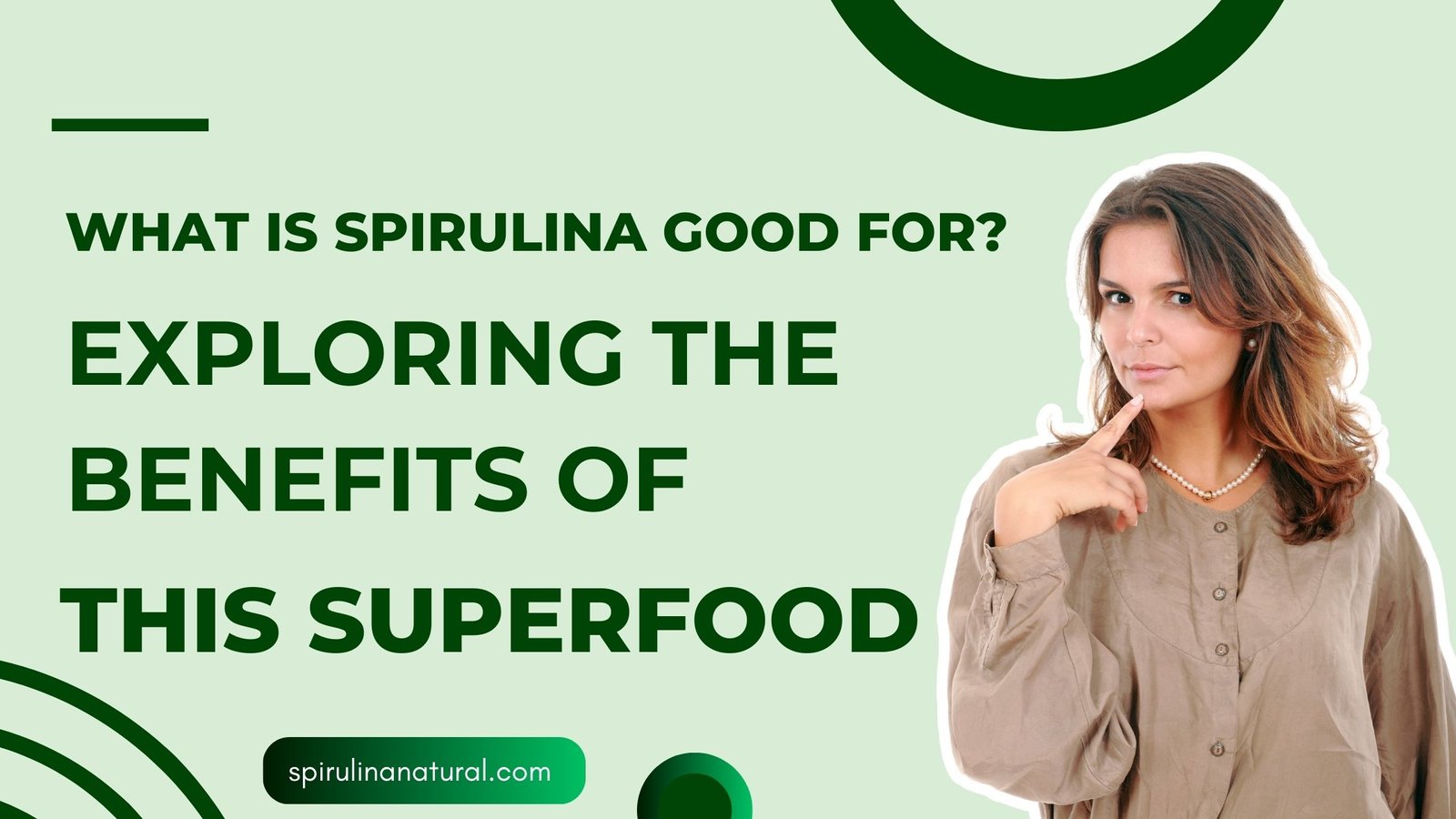Spirulina is a blue-green microalgae that grows in fresh and marine waters. Known by the scientific name Arthrospira, Spirulina has long been utilised by various cultures as a nutrient-rich food source. In recent decades, Spirulina’s popularity as a dietary supplement has increased due to its exceptional nutritional content and diverse health benefits. This article will review the nutritional content and natural benefits of Spirulina.
Nutrient Content in Spirulina
Spirulina is one of the most complete and rich sources of nutrients available. Here are some of the main components found in Spirulina :
1. Protein

Spirulina Natural has a protein content of about 60-70% of its dry weight, making it one of the highest sources of plant-based protein. This protein is complete, which means it contains all the essential amino acids the body needs, highly beneficial for vegetarians and vegans.
2. Vitamins

Spirulina is rich in various important vitamins, including:
– Vit A (Beta-carotene): Essential for maintaining eye health and supporting the immune system.
– Vit B1 (Thiamine): Helps with energy metabolism and nerve function.
– Vitamin B2 (Riboflavin): Aids in energy production and maintains skin health. – Vitamin B3 (Niacin): Plays a role in carbohydrate, fat, and protein metabolism.
– Vit B6 (Pyridoxine): Important for protein metabolism and cognitive function.
– Vit B9 (Folic Acid): Important for red blood cell production and foetal health.
– Vitamin C: Antioxidant that protects body cells from damage and supports the immune system.
– Vitamin E: Antioxidant that protects body cells from oxidative damage.
3. Minerals

Spirulina Natural contains a variety of essential minerals, including:
– Iron: Crucial for the formation of red blood cells and the prevention of anemia.
– Calcium: A very important mineral for healthy bones and teeth.
– Magnesium: Involved in more than 300 biochemical reactions in the body, including energy production.
-Potassium: Important for heart and muscle function.
– Zinc: Enhances immune system function and supports wound healing.
4. Essential Fatty Acids

Spirulina contains essential fatty acids such as linoleic acid and gamma-linolenic acid (GLA). These fatty acids are important for heart health and help reduce inflammation in the body.
5. Antioxidants

Spirulina is rich in antioxidants such as beta-carotene, zeaxanthin, and phycocyanin. The antioxidants contained in spirulina are used to protect the body from oxidative damage caused by free radicals.
6. Chlorophyll

Spirulina contains high amounts of chlorophyll. Chlorophyll has detoxifying properties and helps to cleanse the blood and increase red blood cell production.
Health Benefits of Spirulina

Based on its rich nutritional content, Spirulina offers a range of significant health benefits. Here are some of the key benefits of Spirulina :
1. Boosts Immune System
Spirulina can boost the immune system by stimulating the production of antibodies and immune cells. The vitamins, minerals, and antioxidants in Spirulina help the body fight infections and diseases more effectively.
2. Increases Energy and Stamina
The high-quality protein and B vitamins in Spirulina help boost energy and stamina. Taking Spirulina regularly can help reduce fatigue and improve physical performance, making it ideal for athletes and individuals with active lifestyles.
3. Detoxifies the Body
The chlorophyll in Spirulina has powerful detoxifying properties. Spirulina helps bind toxins and heavy metals in the body, accelerating their elimination through the digestive system.This is especially beneficial for people exposed to pollution or toxic chemicals.
4. Lowers Cholesterol Levels
Research shows that Spirulina can help lower bad cholesterol (LDL) levels and increase good cholesterol (HDL) levels in the blood. This helps reduce the risk of heart disease and stroke, making Spirulina a beneficial addition to a heart-healthy diet.
5. Controls Blood Sugar
Some studies suggest that Spirulina may help control blood sugar levels in people with type 2 diabetes. Spirulina helps improve insulin sensitivity and reduce inflammation associated with diabetes, thus helping to better manage this condition.
6. Supports Digestive Health
Spirulina has prebiotic properties that can support the growth of good bacteria in the gut. This helps to promote digestive health and prevent digestive problems such as constipation and diarrhoea. In addition, Spirulina is also easy to digest, making it a good choice for people with digestive disorders.
7. Keeps Eyes Healthy
The beta-carotene and zeaxanthin content in Spirulina is excellent for eye health. These antioxidants help protect the eyes from oxidative damage and reduce the risk of age-related eye diseases such as macular degeneration and cataracts.
8. Weight Loss
Spirulina can help in weight loss programmes as it is high in protein which can increase satiety and reduce appetite. Additionally, Spirulina is low in calories, making it an ideal choice for low-calorie diets. Taking Spirulina before meals can help reduce total calorie intake.
9. Improves Skin Health
The antioxidants present in spiruna help to protect the skin from damage caused by UV rays and pollution Spirulina also helps to accelerate wound healing and reduce inflammation in the skin. Topical use of Spirulina has also been shown to help treat skin conditions such as acne and eczema.
10. Improves Heart Health
In addition to its function of lowering blood fat levels, spirulina can also reduce high blood pressure. The essential fatty acids in Spirulina help maintain a healthy heart and reduce the risk of cardiovascular disease. Taking Spirulina regularly can help improve overall heart health.
How to consume Spirulina

Spirulina Natural is available in multiple forms, such as powder, tablets, and capsules.. Spirulina’s powder can be added to smoothies, juices, or other foods, making it easy to incorporate into your daily diet. Spirulina tablets and capsules can be taken directly with water, making it convenient to consume at any time.
To get the optimal benefits from Spirulina, it is important to consume in appropriate doses. Recommended doses usually range from 1-3 grams per day, although some studies use doses of up to 10 grams per day without significant side effects. You can start by taking small doses of spirulina and monitoring the progress of your body’s reaction to spirulina.
Also Read : Benefits and Side Effects of Spirulina
Conclusion
Spirulina is one of the most beneficial natural sources of nutrients for health. With a high content of protein, vitamins, minerals, essential fatty acids, antioxidants and chlorophyll, Spirulina offers a range of significant health benefits. From boosting the immune system to supporting cardiovascular and digestive health, Spirulina is a valuable addition to the daily diet.
Nonetheless, it is important to consume Spirulina in reasonable amounts and according to the body’s needs. Consult a healthcare professional before starting Spirulina use, especially if you have certain health conditions or are taking certain medications. By doing so, you can ensure that you get the maximum benefits from Spirulina without the risk of side effects.








One Response